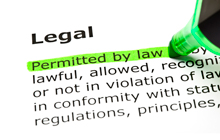PIT BULLS
 QUESTION: Our condo association is plagued with prostitutes, drug use and pit bulls. I'm a non-voting member of the board and want to know what we can do about the pit bulls.
QUESTION: Our condo association is plagued with prostitutes, drug use and pit bulls. I'm a non-voting member of the board and want to know what we can do about the pit bulls.ANSWER: Before we get to the interesting part of your question, what is a nonvoting member of the board? Without the power to vote, a nonvoting director is really an advisor not a director. The Corporations Code defines "directors" as:
natural persons designated...elected or appointed...to act as members of the governing body of the corporation... A person who does not have...voting rights as a member of the governing body of the corporation, is not a director...regardless of title. (Corp. Code §5047.)Your association's legal counsel should review your governing documents to see if they truly provide for nonvoting directors. If so, they should be amended since there may be attorney-client privilege problems if non-directors are privy to executive session meetings involving the association's attorney.
Pit Bulls. I noticed it's a class of dogs that bothers you, i.e., compact muscular dogs with great jaw strength such as pit bull terriers, Staffordshire bull terriers, and bulldogs. If your board were to get rid of the prostitution and drug use, I suspect most of your pit bulls would join the exodus.
RECOMMENDATION: The task will be daunting but your board should work with the police and legal counsel to clean up the development. Or, in the alternative, you could designate yourselves a "sanctuary association" for drug dealers and prostitutes and then apply for federal subsidies. You could be eligible for truckloads of money.
DECLARANT LANGUAGE IN DOCUMENTS
 QUESTION: Our CC&Rs and bylaws have never been revised. In a number of provisions, powers are given to the "Declarant." Since the builder has been gone for over 20 years, should these provisions be removed from our documents?
QUESTION: Our CC&Rs and bylaws have never been revised. In a number of provisions, powers are given to the "Declarant." Since the builder has been gone for over 20 years, should these provisions be removed from our documents?ANSWER: Yes they should.
Declarant Defined. As defined by the Davis-Stirling Act, a "declarant" is one who creates the original documents that govern the association.(Civ. Code §4130.) Declarants normally give themselves a great deal of power and voting rights so they can complete the development and sell units without interference from homeowners.
Confusing. Declarant language can be very confusing to directors and members alike. Is the association a successor to the declarant? Does the association have the powers of the declarant? Is the association allowed to modify or delete declarant language? In short, the association is not a successor to the developer and does not have a declarant's powers. And yes, associations can delete declarant provisions once the builder no longer has an interest in the development.
RECOMMENDATION. Associations should, at some point, update their documents. When they do, declarant language should be deleted along with all the legalese that goes with it. It gives you the opportunity to clarify maintenance issues (always a source of conflict and potential liability), add director qualifications, incorporate changes in the law, and make the documents easier to read.
WHEN IS A DAY A DAY?
 QUESTION: I am trying to obtain the legal definition for a "day" as it applies to our HOA. If a "2-day notice" of a meeting is given at 8:30 on a Thursday night, Saturday morning at 9:30 is not 48 hours.
QUESTION: I am trying to obtain the legal definition for a "day" as it applies to our HOA. If a "2-day notice" of a meeting is given at 8:30 on a Thursday night, Saturday morning at 9:30 is not 48 hours.ANSWER: Fortunately, defining a day is easier than defining what the meaning of "is" is. The Sixth Edition of Black's Law Dictionary states, "This word ["is"], although normally referring to the present, often has a future meaning, but is not synonymous with 'shall have been.' It may have, however, a past signification, as in the sense of 'has been.'" Like I said, it's not easy to define--even presidents struggle with it.
The definition of "day," however is fairly straightforward. Black's Law Dictionary defines it as "A period of time consisting of twenty-four hours" or "The period of time during which the earth makes one revolution on its axis." It's when you get to the fourth definition that it gets contrary: "The whole or any part of period of 24 hours from midnight to midnight." Fortunately, that definition came from a case out of Kentucky so I think we can discount it. I prefer the common-sense 24-hour definition.
RECOMMENDATION: It's always better to err on the side of full 24-hour periods so as to avoid legal challenges. If you give 4-day's notice of a board meeting by posting on Monday at 5:00 p.m., the meeting should not be called to order until Friday at 5:00 p.m.
 QUESTION: I know that board members are legally protected but what about committee members (like a rules committee, newsletter committee, finance committee, etc.)? Are they also protected under the Civil and Corporations Code?
QUESTION: I know that board members are legally protected but what about committee members (like a rules committee, newsletter committee, finance committee, etc.)? Are they also protected under the Civil and Corporations Code? QUESTION: Our HOA has only five owners and all owners are on the board. Can an owner, under the D&O coverage, sue the board for an issue as an individual owner? My thought is that you can't sue yourself, yet they wear two hats...board member and homeowner.
QUESTION: Our HOA has only five owners and all owners are on the board. Can an owner, under the D&O coverage, sue the board for an issue as an individual owner? My thought is that you can't sue yourself, yet they wear two hats...board member and homeowner.  QUESTION: I rented my condo to a family of six--two adults and four children. The HOA now wants owners to pay for water based on the number of occupants rather than equally as is currently done. Can the HOA legally require me to pay for water based on the number of occupants?
QUESTION: I rented my condo to a family of six--two adults and four children. The HOA now wants owners to pay for water based on the number of occupants rather than equally as is currently done. Can the HOA legally require me to pay for water based on the number of occupants?
 QUESTION: In light of the drought emergency, can reserve funds be used for drought-friendly landscape renovations?
QUESTION: In light of the drought emergency, can reserve funds be used for drought-friendly landscape renovations? QUESTION: Less than sixty days before our annual meeting a group of homeowners submitted a petition to recall the existing board. As required by statute, the board gave notice of a special meeting. It will take place a month after the annual meeting. Under the circumstances, what is the effect of the petition?
QUESTION: Less than sixty days before our annual meeting a group of homeowners submitted a petition to recall the existing board. As required by statute, the board gave notice of a special meeting. It will take place a month after the annual meeting. Under the circumstances, what is the effect of the petition? QUESTION: The Davis-Stirling Act states that ONE or THREE independent third parties must be chosen as inspectors of election. Since tabulations must take place in public, it appears suspicious when there are only two at the table when the law requires one or three. If the Inspector brings someone to open the ballots, does he count as an inspector because he is touching and unfolding ballots? If the assistant SORTS the ballots (touching the ballots) and asks questions to the Inspector about ballots, does he become an inspector?
QUESTION: The Davis-Stirling Act states that ONE or THREE independent third parties must be chosen as inspectors of election. Since tabulations must take place in public, it appears suspicious when there are only two at the table when the law requires one or three. If the Inspector brings someone to open the ballots, does he count as an inspector because he is touching and unfolding ballots? If the assistant SORTS the ballots (touching the ballots) and asks questions to the Inspector about ballots, does he become an inspector?
 QUESTION: Our board says members are not allowed to speak until the end of the meeting. Therefore, we are not allowed to express our opinions before an action is taken on an item on the agenda. Should we not be allowed to speak when that item comes up for discussion?
QUESTION: Our board says members are not allowed to speak until the end of the meeting. Therefore, we are not allowed to express our opinions before an action is taken on an item on the agenda. Should we not be allowed to speak when that item comes up for discussion?